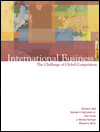Realize that much money is made, and lost, in the foreign exchange (Fx) markets.
The foreign exchange (Fx) markets are worldwide and collectively involve more money than any other market. On most days you can trade money 24 hours somewhere in the world. Understand Fx quotations, including cross rates.
Fx information can be found in financial publications such as The Wall Street Journal, the Financial Times, and the financial section of major newspapers. The Wall Street Journal lists major currencies in terms of their trades with the US$. The spot rate (for delivery in two business days) is reported for all currencies. For the more heavily traded currencies, 30-, 90-, and 180-day forward rates are reported. Recognize currency exchange risks.
A currency exchange risk is borne by whoever is to receive a foreign currency or is to pay a foreign currency in the future. Understand currency exchange controls.
Most countries have less hard, convertible currencies than they need. They therefore ration them. Anyone wanting them must apply to a government agency, specifying how much is wanted and the use to which it will be put. Anticipate financial forces such as balance of payments, tariffs, taxes, inflation, fiscal and monetary policies, and differing accounting practices that affect business.
Business managers must be prepared to react to financial forces that can affect the business. These include balance-of-payments deficits, tariffs and other taxes, inflation, and fiscal or monetary policies of the host government. Accounting policies and practices differ from country to country, so business must conform to host country rules and translate the resulting numbers for them to be understood by people in the home country. Understanding sovereign debt, its causes, and its solutions.
Sovereign debt is the debt of a government. Commercial and investment banks are in the business of lending money or underwriting bonds through which governments borrow money. As governments receive the borrowed money, corruption and inefficiency can arise, so that a lot of the money does not benefit the country or its people. Some of the debt is repaid, but much is rescheduled or swapped for assets or other uses. Know that a new small business in a developing country might be a better credit risk than the government in a developing country.
Some of the best credit risks in developing countries are the small business entrepreneurs. | 



 2002 McGraw-Hill Higher Education
2002 McGraw-Hill Higher Education